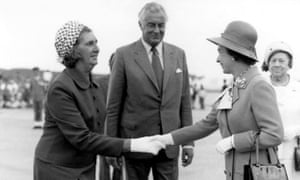Extract from The Guardian
How much Queen Elizabeth knew about the unprecedented dismissal of the former prime minister Gough Whitlam has remained secret for more than 40 years.
Dozens of secret letters between Buckingham Palace and then governor general Sir John Kerr in the months before the shocking 1975 dismissal could hold the key, according to award-winning historian Jenny Hocking.
Her bid to have the so-called “palace letters” released by the National Archives of Australia is scheduled to be heard in the federal court in Sydney on Monday.
“It’s the nature of these, the timing of them and the fact that they appear to be prolific at the time of the dismissal, that makes them significant,” Hocking said ahead of the hearing.
“It will give us a real insight into what Kerr was thinking, what he was considering as his options in the lead-up to the dismissal.
“And I think more significantly, how much the palace knew about that aspect of Kerr’s entire thinking.”
The National Archives is refusing to release the letters because they have been deemed “personal” communications rather than official commonwealth records.
“It’s perverse to see them as personal letters given who they’re portraying,” Hocking said.
It is possible the public may never see them – the current embargo lasts until at least 2027 but the Queen holds a final veto over their release.
But Hocking said the documents were crucial historic records and Australians should know the full story.
“The dismissal is unusual because it’s been cast in so much secrecy at the time and since,” the academic said.
Other archival material that revealed Sir John consulted with high court judge Sir Anthony Mason before sacking Whitlam “totally changed the way we looked at the dismissal”.
“We need to know what else is there,” Hocking said.
Dozens of secret letters between Buckingham Palace and then governor general Sir John Kerr in the months before the shocking 1975 dismissal could hold the key, according to award-winning historian Jenny Hocking.
Her bid to have the so-called “palace letters” released by the National Archives of Australia is scheduled to be heard in the federal court in Sydney on Monday.
“It’s the nature of these, the timing of them and the fact that they appear to be prolific at the time of the dismissal, that makes them significant,” Hocking said ahead of the hearing.
“It will give us a real insight into what Kerr was thinking, what he was considering as his options in the lead-up to the dismissal.
The National Archives is refusing to release the letters because they have been deemed “personal” communications rather than official commonwealth records.
“It’s perverse to see them as personal letters given who they’re portraying,” Hocking said.
It is possible the public may never see them – the current embargo lasts until at least 2027 but the Queen holds a final veto over their release.
But Hocking said the documents were crucial historic records and Australians should know the full story.
“The dismissal is unusual because it’s been cast in so much secrecy at the time and since,” the academic said.
Other archival material that revealed Sir John consulted with high court judge Sir Anthony Mason before sacking Whitlam “totally changed the way we looked at the dismissal”.
“We need to know what else is there,” Hocking said.

No comments:
Post a Comment